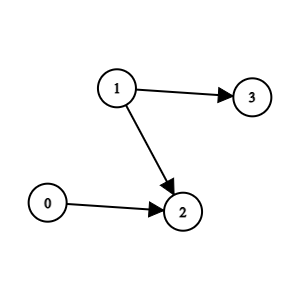| comments | difficulty | edit_url | rating | source | tags | |
|---|---|---|---|---|---|---|
true |
Medium |
1430 |
Weekly Contest 370 Q2 |
|
There are n teams numbered from 0 to n - 1 in a tournament; each team is also a node in a DAG.
You are given the integer n and a 0-indexed 2D integer array edges of length m representing the DAG, where edges[i] = [ui, vi] indicates that there is a directed edge from team ui to team vi in the graph.
A directed edge from a to b in the graph means that team a is stronger than team b and team b is weaker than team a.
Team a will be the champion of the tournament if there is no team b that is stronger than team a.
Return the team that will be the champion of the tournament if there is a unique champion, otherwise, return -1.
Notes
- A cycle is a series of nodes
a1, a2, ..., an, an+1such that nodea1is the same node as nodean+1, the nodesa1, a2, ..., anare distinct, and there is a directed edge from the nodeaito nodeai+1for everyiin the range[1, n]. - A DAG is a directed graph that does not have any cycle.
Example 1:
Input: n = 3, edges = [[0,1],[1,2]] Output: 0 Explanation: Team 1 is weaker than team 0. Team 2 is weaker than team 1. So the champion is team 0.
Example 2:
Input: n = 4, edges = [[0,2],[1,3],[1,2]] Output: -1 Explanation: Team 2 is weaker than team 0 and team 1. Team 3 is weaker than team 1. But team 1 and team 0 are not weaker than any other teams. So the answer is -1.
Constraints:
1 <= n <= 100m == edges.length0 <= m <= n * (n - 1) / 2edges[i].length == 20 <= edge[i][j] <= n - 1edges[i][0] != edges[i][1]- The input is generated such that if team
ais stronger than teamb, teambis not stronger than teama. - The input is generated such that if team
ais stronger than teamband teambis stronger than teamc, then teamais stronger than teamc.
Based on the problem description, we only need to count the in-degrees of each node and record them in an array
The time complexity is
class Solution:
def findChampion(self, n: int, edges: List[List[int]]) -> int:
indeg = [0] * n
for _, v in edges:
indeg[v] += 1
return -1 if indeg.count(0) != 1 else indeg.index(0)class Solution {
public int findChampion(int n, int[][] edges) {
int[] indeg = new int[n];
for (var e : edges) {
++indeg[e[1]];
}
int ans = -1, cnt = 0;
for (int i = 0; i < n; ++i) {
if (indeg[i] == 0) {
++cnt;
ans = i;
}
}
return cnt == 1 ? ans : -1;
}
}class Solution {
public:
int findChampion(int n, vector<vector<int>>& edges) {
int indeg[n];
memset(indeg, 0, sizeof(indeg));
for (auto& e : edges) {
++indeg[e[1]];
}
int ans = -1, cnt = 0;
for (int i = 0; i < n; ++i) {
if (indeg[i] == 0) {
++cnt;
ans = i;
}
}
return cnt == 1 ? ans : -1;
}
};func findChampion(n int, edges [][]int) int {
indeg := make([]int, n)
for _, e := range edges {
indeg[e[1]]++
}
ans, cnt := -1, 0
for i, x := range indeg {
if x == 0 {
cnt++
ans = i
}
}
if cnt == 1 {
return ans
}
return -1
}function findChampion(n: number, edges: number[][]): number {
const indeg: number[] = Array(n).fill(0);
for (const [_, v] of edges) {
++indeg[v];
}
let [ans, cnt] = [-1, 0];
for (let i = 0; i < n; ++i) {
if (indeg[i] === 0) {
++cnt;
ans = i;
}
}
return cnt === 1 ? ans : -1;
}function findChampion(n, edges) {
const indeg = Array(n).fill(0);
for (const [_, v] of edges) {
++indeg[v];
}
let [ans, cnt] = [-1, 0];
for (let i = 0; i < n; ++i) {
if (indeg[i] === 0) {
++cnt;
ans = i;
}
}
return cnt === 1 ? ans : -1;
}function findChampion(n: number, edges: number[][]): number {
const vertexes = new Set<number>(Array.from({ length: n }, (_, i) => i));
for (const [_, v] of edges) {
vertexes.delete(v);
}
return vertexes.size === 1 ? vertexes[Symbol.iterator]().next().value! : -1;
}function findChampion(n, edges) {
const vertexes = new Set(Array.from({ length: n }, (_, i) => i));
for (const [_, v] of edges) {
vertexes.delete(v);
}
return vertexes.size === 1 ? vertexes[Symbol.iterator]().next().value : -1;
}
